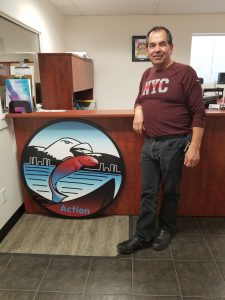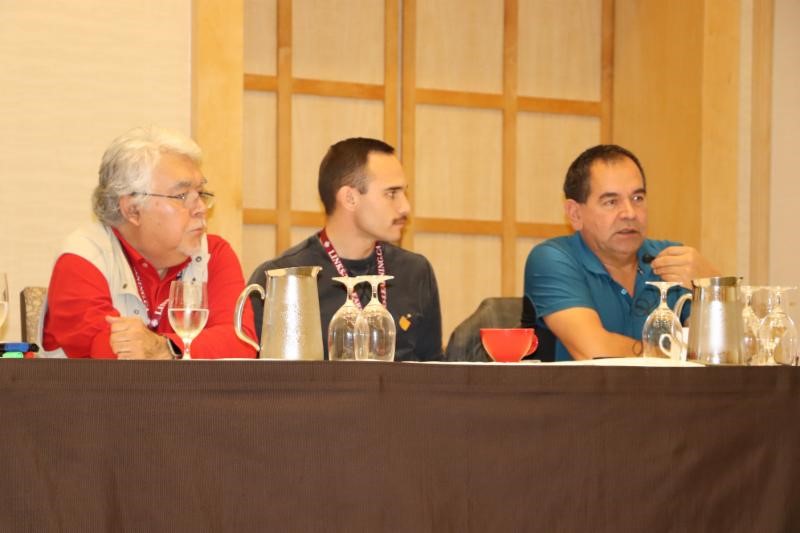
Tell us a bit about the Aboriginal Business and Community Development Centre. How and why did it start?
I was one of the founding members of ABCDC since 1995. At that time, I was working in my construction company, I had just completed an extensive house renovation and was completing a detached garage. I was approached by two leaders of current community service providers to assist with the planning of a business development service organization. I assisted with the original business plan and the funding applications and we secured funding to train two Community Development workers.
In 1995, I became the first employee and was hired as a trainee. Mike Bazoki from Lheidli T’enneh was hired in February 1996. The program ran as a training initiative until May 1997, we applied for and became incorporated as a Not-For-Profit in July 1997. As a beginning to my training I was given a book by our trainer Victor Cumming, this book on community development titled “Ripples from the Zambezi” by Ernesto Sirollli, a world-renowned community development director.
Reflecting on those early days, I describe it as the “weirdest start to a job in my life.” The book’s story resonated with Indigenous people, where community developers in Zambezi assisted locals in growing tomato farms, only to have hippos devour their harvest. The locals responded with a nonchalant “well, you didn’t ask” when questioned about the hippos. The mission was to meet people’s needs and assist them in achieving their goals. It began with the genuine premise of community development leading to economic development. I read the book in three hours, revisited it twice more, and came to the realization that it’s not that simple. Essentially, whoever comes through the door, we help. It has been an amazing 26 years, and even during a period when I temporarily left, I always came back.
While it started in Prince George, it has now expanded nationally. ABCDC has become one of the leading community economic development organizations for Indigenous people, offering its services for free. Our first client was a woman from Manitoba, an artisan specializing in traditional clothing, beading, and crafts with leather. Over the years, she expanded her business threefold and transitioned to a storefront 15 years ago.
Why does precarity matter to you right now and for the future for Indigenous peoples?
It matters in numerous ways, both presently and historically. Growing up on the reserve, there was consistently only seasonal work available, such as in construction, providing employment for around 6-7 months a year. I also worked part-time in lumber mills, but frequent layoffs meant I only had 2-3 months of work annually. Finding residences and apartments was challenging due to prevalent racism, a hurdle that extended to business as well. Even as a young carpenter starting my own business, I faced the challenges of being the first generation entrepreneur in my family. I couldn’t envision subjecting myself to the precarious cycle of work that I observed within my family. Precarity was a recurring theme, with family members relying on summer jobs just enough to qualify for employment insurance. This cycle persisted through generations.
 My involvement with the friendship center movement, the largest in Canada with 250 employees across 11 locations, began as an employee assisting people in securing jobs. However, I observed a pervasive trend of only 5-month work contracts being available, lacking stability. This is when the issue of housing came into focus for me. By this point, I had established myself and had good references, but many in my family struggled to find proper residences, often ending up with subpar living conditions under slumlords. Homelessness became a significant problem stemming from job insecurity, even when individuals received training but struggled to find secure employment.
My involvement with the friendship center movement, the largest in Canada with 250 employees across 11 locations, began as an employee assisting people in securing jobs. However, I observed a pervasive trend of only 5-month work contracts being available, lacking stability. This is when the issue of housing came into focus for me. By this point, I had established myself and had good references, but many in my family struggled to find proper residences, often ending up with subpar living conditions under slumlords. Homelessness became a significant problem stemming from job insecurity, even when individuals received training but struggled to find secure employment.
Breaking free from the precarious work cycle that ensnared my family was possible because of my cultural upbringing. The connection between cultural heritage and my ability to escape this cycle was profound. For instance, the upbringing of the children in my family varied; the four oldest were raised far from traditional territories while my father worked up North, distancing them from the land. My sister and I, on the other hand, had more contact with our cultural roots, especially when our father was involved in politics. Growing up around aunties, uncles, and grandparents shaped our characters differently from our two youngest brothers and sisters, and unfortunately, my younger brother ended up in jail.
“You never know it all! I had two clients this year where I told them “I don’t know how to help you. Let me learn.”
– Vincent Prince
How do you think the issue of precarity should be addressed?
If I knew the causes it would be easier to answer. People are just trying to get enough work to get off the welfare system. It doesn’t make sense to have a short-term investment in people just to get by – there needs to be long-term solutions.
Precarity can be reduced when we are willing to accept help to move forward, such as receiving our free support services at ABCDC. I’ve taken so many crap jobs in my life because I wanted to keep working. From a cook to landscaping. It’s important to have the willingness to keep going until you find out what suits you.
